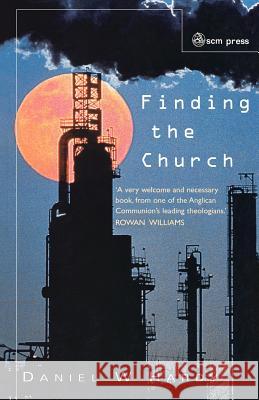Finding the Church » książka
Finding the Church
ISBN-13: 9780334028635 / Angielski / Miękka / 2001 / 312 str.
Amongst the churches, Anglicanism is distinctive by virtue of its attempt to participate in the life and purposes of God and to make them known through history and in the practicalities of particular situations.Yet the distinctiveness of this position, and what its implications are for the Church's ongoing life, are not well appreciated. As a result, the churches of the Anglican Communion often find themselves caught in painful struggles about major issues concerning their own basis and practice, to such a degree that there are constant threats of division. The essays in this book begin from the struggles that have emerged in recent years, since the 1998 Lambeth Conference, and show the deeper issues at stake.f hey respond with proposals for the future, focusing especially on the wisdom which manifests itself in the Church, and how this needs to be furthered in the worship, order and practice of the Church in the breadth of its mission in each place.They conclude with some considerations of the wider role of the Church in responding to spirituality and money.Together they form a powerful statement of the tasks of Anglicanism today from which other traditions have much to learn. Finding the Church makes a very significant contribution to a number of important debates and discussions, and is certain to generate considerable discussion of its own. Daniel W Hardy was, until his retirement in 1995, Director of the Center of Theological Inquiry in Princeton, prior to which he was Van Mildert Professor of Divinity in the University of Durham. He is now a Senior Member of the Faculty of Divinity in the University of Cambridge. He is the author of a previous collection, God's Ways with the World. and his many other essays include contributions to The Oxford Companion to Christian Thought, On Being the Church and The Modern Theologians.
Amongst the churches, Anglicanism is distinctive by virtue of its attempt to participate in the life and purposes of God and to make them known through history and in the practicalities of particular situations.Yet the distinctiveness of this position, and what its implications are for the Churchs ongoing life, are not well appreciated. As a result, the churches of the Anglican Communion often find themselves caught in painful struggles about major issues concerning their own basis and practice, to such a degree that there are constant threats of division.The essays in this book begin from the struggles that have emerged in recent years, since the 1998 Lambeth Conference, and show the deeper issues at stake.f hey respond with proposals for the future, focusing especially on the wisdom which manifests itself in the Church, and how this needs to be furthered in the worship, order and practice of the Church in the breadth of its mission in each place.They conclude with some considerations of the wider role of the Church in responding to spirituality and money.Together they form a powerful statement of the tasks of Anglicanism today from which other traditions have much to learn.Finding the Church makes a very significant contribution to a number of important debates and discussions, and is certain to generate considerable discussion of its own.Daniel W Hardy was, until his retirement in 1995, Director of the Center of Theological Inquiry in Princeton, prior to which he was Van Mildert Professor of Divinity in the University of Durham. He is now a Senior Member of the Faculty of Divinity in the University of Cambridge. He is the author of a previous collection, Gods Ways with the World. and his many other essays include contributions to The Oxford Companion to Christian Thought, On Being the Church and The Modern Theologians.











